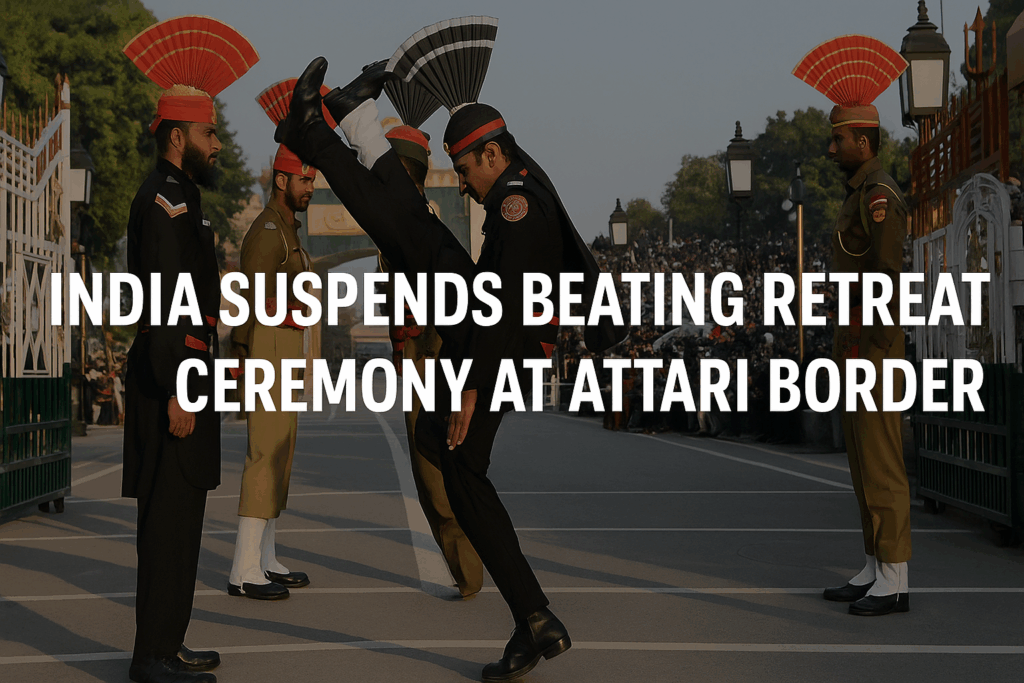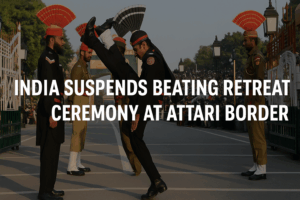
Security measures and anti-terrorism statements from India emerged as India recovered from the catastrophic terrorist strike that took place in Pahalgam Jammu and Kashmir. The Attari-Wagah border ceremony known as Beating Retreat suspends because India wants to express its stance against terrorism and communicate security concerns.
The Pahalgam Terror Attack Tragedy
Militants launched their violent assault against visitors at the scenic town of Pahalgam on April 23, 2025 that killed 27 people and included 25 Indian nationals along with one Nepalese person and endangered 17 more visitors. The attack carried out by Kashmir Resistance has become leading among Indian terrorist incidents since the 2008 Mumbai attacks. Documents from Indian authorities show that Kashmir Resistance links to terrorist organizations supported by Pakistan which include Lashkar-e-Taiba and Hizbul Mujahideen.
The violence has triggered massive grief while escalating the conflict levels between Pakistan and India because India directly blames its neighbor for promoting terrorism across borders. Multiple steps have been taken by India which include shutting down its main border with Pakistan together with revoking the Indus Waters Treaty and pulling out its diplomatic representatives from Islamabad.
India Suspends Beating Retreat Ceremony
The daily Beating Retreat Ceremony has suspends at the Attari-Wagah border by India. The Border Security Force (BSF) of India jointly conducts this ceremony in partnership with Pakistan Rangers which began performing since 1959 at the Attari-Wagah border and attracts huge crowds of spectators who watch the flag-lowering ceremonies and military drills representing India-Pakistan diplomatic complexities.
India demonstrates its commitment to national security by suspending the ceremony because it holds a zero-tolerance stance against terrorism. The decision to stop this symbolic ceremony serves India as a powerful statement to condemn the attack while demonstrating disapproval of backing terrorist activities.
Historical Context and Significance
Throughout history the Beating Retreat ceremony functioned as a military drill alongside representing the complicated bond that exists between India and Pakistan. Citizens can witness the daily border-crossing celebration at Attari-Wagah that illustrates the relationship dynamics between India and Pakistan.
Such interruptions to the ceremony have already occurred in past events. The border has been closed upon India’s surgical strikes in 2016 as well as during other times of intense tension. These routine closures have double functions that protect security while demonstrating the current status of diplomatic ties between both nations.
Broader Implications
The Beating Retreat ceremony stopped its performance because India implemented a series of responses after the Pahalgam attack. Since 1960 the Indus Waters Treaty has endured numerous conflicts but India has now decided to suspend this important agreement. The diplomatic tension between India and Pakistan has augmented to dangerous levels as the country performs a total border closure at Wagah-Attari which serves as the only transportation point for Indian and Pakistani passengers.
The adopted policies show India’s dedication to stop terrorism while safeguarding its protective interests. Such symbolic events like the Beating Retreat ceremony function as both diplomatic tools and obstacles based on the political environment between India and Pakistan.
Know More: 2025 Pahalgam Terror Attack: Tragic Assault on Tourists in Kashmir
Conclusion
Following the Pahalgam attack India suspends the daily Attari-Wagah border Beating Retreat Ceremony display as this event symbolized both fragile stability between nations and extensive terrorism damage to diplomatic cooperation. The ceremonial tradition which used to symbolize India-Pakistan relationships now remains stopped as a sign of country’s massive commitment to counter terrorism.
This action sends twofold messages to the nation while honoring victims of the Pahalgam attack because India stands committed to safeguarding its people and preserving territorial sovereignty.






